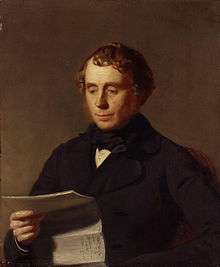William Baillie-Hamilton

Admiral William Alexander Baillie-Hamilton (6 June 1803 – 1 October 1881)[1] was a British naval commander. He served on the Arctic Council when it was searching for Sir John Franklin.
Biography
A member of the Baillie-Hamilton family headed by the Earl of Haddington, he was the son of the Venerable Charles Baillie, Archdeacon of Cleveland and his wife Lady Charlotte Home, daughter of Alexander Home, 9th Earl of Home. Three of his brothers also gained distinction. Sir George Baillie was Ambassador to Tuscany; Charles Baillie-Hamilton was a politician; Ker Baillie-Hamilton was Governor of the Leeward Islands; and Cospatrick Baillie-Hamilton was also an Admiral in the Royal Navy.[2] Hamilton served on the Arctic Council when it was searching for Sir John Franklin. He married Harriet Hamilton (1812–1884), daughter of James Hamilton, Viscount Hamilton, in 1836. They had two daughters and four sons. A gravestone with the names inscribed of William Alexander Baillie-Hamilton's and that of his wife, Harriet Hamilton, lies in Greyfriars Churchyard, Edinburgh. A photograph of gravestone in Greyfriars churchyard, Edinburgh can be found at https://www.flickr.com/photos/dawnone/13661219655/ He is listed as having died in Portree, on the Isle of Skye.[2]
He became Second Secretary to the Admiralty on 28 April 1845.
His son, also William (1844–1920), played football for Scotland in the first of the England v Scotland representative matches (1870–1872) and was later a senior civil servant.[3] Another son, Charles (1848–1927), also played for Scotland in the same match.[4]
References
- 1 2 William Alexander Baillie Hamilton, National Portrait Gallery, London, accessed September 2009
- 1 2 Lundy, Darryl. "p. 11066". The Peerage., accessed September 2009
- ↑ Lundy, Darryl. "Sir William Alexander Baillie-Hamilton". The Peerage.com. Retrieved 25 February 2011.
- ↑ "England v Scotland 1870". Retrieved 30 April 2011.
External links
| Military offices | ||
|---|---|---|
| Preceded by John Barrow |
Second Secretary to the Admiralty 1845–1855 |
Succeeded by Thomas Phinn |